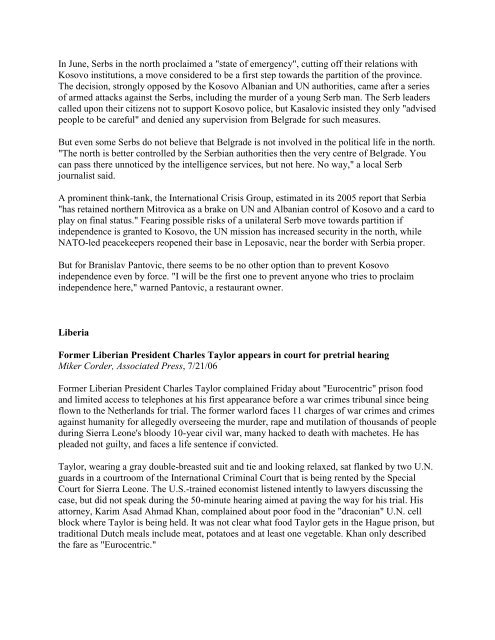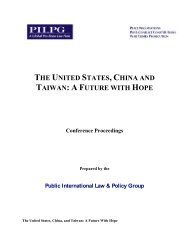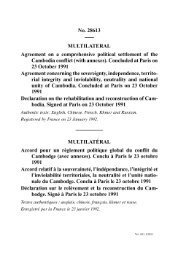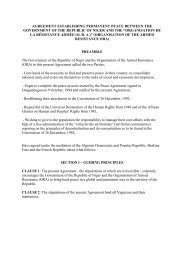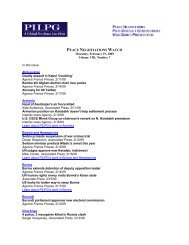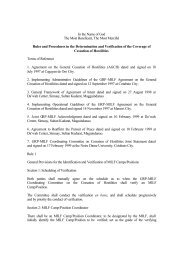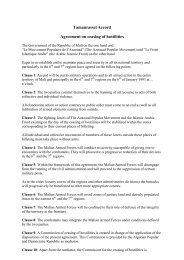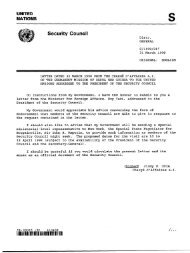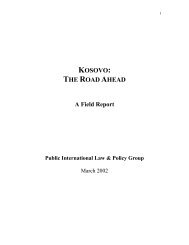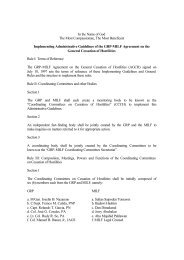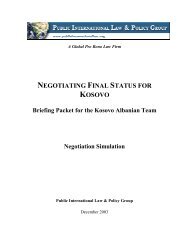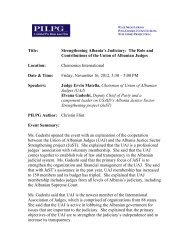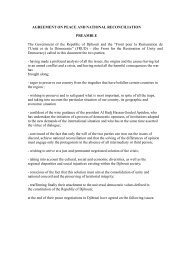Peace Negotiations Watch- Volume V, Number 17, July 26, 2006
Peace Negotiations Watch- Volume V, Number 17, July 26, 2006
Peace Negotiations Watch- Volume V, Number 17, July 26, 2006
- No tags were found...
Create successful ePaper yourself
Turn your PDF publications into a flip-book with our unique Google optimized e-Paper software.
In June, Serbs in the north proclaimed a "state of emergency", cutting off their relations withKosovo institutions, a move considered to be a first step towards the partition of the province.The decision, strongly opposed by the Kosovo Albanian and UN authorities, came after a seriesof armed attacks against the Serbs, including the murder of a young Serb man. The Serb leaderscalled upon their citizens not to support Kosovo police, but Kasalovic insisted they only "advisedpeople to be careful" and denied any supervision from Belgrade for such measures.But even some Serbs do not believe that Belgrade is not involved in the political life in the north."The north is better controlled by the Serbian authorities then the very centre of Belgrade. Youcan pass there unnoticed by the intelligence services, but not here. No way," a local Serbjournalist said.A prominent think-tank, the International Crisis Group, estimated in its 2005 report that Serbia"has retained northern Mitrovica as a brake on UN and Albanian control of Kosovo and a card toplay on final status." Fearing possible risks of a unilateral Serb move towards partition ifindependence is granted to Kosovo, the UN mission has increased security in the north, whileNATO-led peacekeepers reopened their base in Leposavic, near the border with Serbia proper.But for Branislav Pantovic, there seems to be no other option than to prevent Kosovoindependence even by force. "I will be the first one to prevent anyone who tries to proclaimindependence here," warned Pantovic, a restaurant owner.LiberiaFormer Liberian President Charles Taylor appears in court for pretrial hearingMiker Corder, Associated Press, 7/21/06Former Liberian President Charles Taylor complained Friday about "Eurocentric" prison foodand limited access to telephones at his first appearance before a war crimes tribunal since beingflown to the Netherlands for trial. The former warlord faces 11 charges of war crimes and crimesagainst humanity for allegedly overseeing the murder, rape and mutilation of thousands of peopleduring Sierra Leone's bloody 10-year civil war, many hacked to death with machetes. He haspleaded not guilty, and faces a life sentence if convicted.Taylor, wearing a gray double-breasted suit and tie and looking relaxed, sat flanked by two U.N.guards in a courtroom of the International Criminal Court that is being rented by the SpecialCourt for Sierra Leone. The U.S.-trained economist listened intently to lawyers discussing thecase, but did not speak during the 50-minute hearing aimed at paving the way for his trial. Hisattorney, Karim Asad Ahmad Khan, complained about poor food in the "draconian" U.N. cellblock where Taylor is being held. It was not clear what food Taylor gets in the Hague prison, buttraditional Dutch meals include meat, potatoes and at least one vegetable. Khan only describedthe fare as "Eurocentric."


